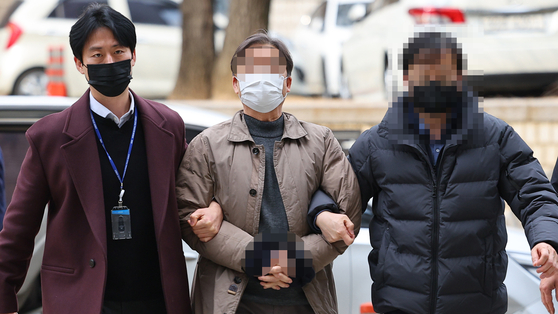Suspected spies for North refuse to cooperate
![One of four South Korean activists accused of inciting sedition on behalf of North Korea enters Seoul Central District Court in Seocho District, southern Seoul on Jan. 31. [YONHAP]](https://koreajoongangdaily.joins.com/data/photo/2023/02/21/27b17192-27c5-4875-90ec-ba3653b0a9eb.jpg)
One of four South Korean activists accused of inciting sedition on behalf of North Korea enters Seoul Central District Court in Seocho District, southern Seoul on Jan. 31. [YONHAP]
Four South Korean activists arrested earlier this month on charges of inciting sedition on orders from North Korea are refusing to cooperate with investigators from the state prosecution service, according to prosecution officials on Tuesday.
The four suspects, who resided in Changwon, South Gyeongsang before their arrest, are accused of establishing an underground organization called the Self-Reliant People’s Liberation Front in 2016 to foment unrest against the South Korean government and the U.S. military presence in the South.
All four were transferred to the custody of the Seoul Central District Prosecutors’ Office on Feb. 17 after the Seoul Central District Court approved their arrest warrants but have declined to speak with either investigators or a human rights compliance officer.
Prosecution officials said the four suspects have resisted summons for questioning while under arrest in various ways, such as lying flat in their jail cells or staging a sit-in when officials came to escort them to interrogation rooms.
The legal team representing the four suspects filed a complaint to the Corruption Investigation Office for High-Ranking Officials on Jan. 28, alleging that investigators from the National Intelligence Service (NIS) threatened one of their clients before their arrest warrants were approved by the court.
A prosecution official who spoke to reporters on condition of anonymity said it was “unfortunate” that the four suspects have refused to meet with the compliance officer tasked with ensuring the conditions of their detention does not violate their rights.
The four suspects also filed a petition to the Constitutional Court on Feb. 8, alleging the charges against them are part of a “North Korea-related scaremongering” campaign by the conservative Yoon Suk Yeol administration.
They have also filed a petition requesting the court examine the constitutionality of current laws which permit the NIS and police to detain suspects accused of violating the National Security Act for up to 20 days, while allowing the prosecution service to keep suspects under arrest for 30 days as part of their investigation.
Although the group requested a court review the legality of both their detention and arrest processes, their request was dismissed.
An official at the Seoul Central District Prosecutors’ Office told reporters on condition of anonymity that the court’s dismissal “confirmed that the detentions and arrests were procedurally legitimate, and that there were clear grounds for the suspects’ detention and arrest.”
Earlier, prosecution officials said that the four suspects used their liberal activism as a front to advance Pyongyang’s agenda in the South.
Although the NIS is still in the process of decoding directives allegedly received by the suspects from the North, intelligence officials told reporters that the majority of the content decrypted thus far contains orders to mobilize protests against South Korea’s conservative government.
South Korean officials have also said that the four met North Korean intelligence agents in various Southeast Asian countries, such as Cambodia.
The four suspects are all members of the South Gyeongsang Progressive Alliance, which since last year has held demonstrations demanding the resignation of President Yoon Suk Yeol and the suspension of joint military exercises by South Korea and the United States.
BY KIM MIN-JOONG,MICHAEL LEE [lee.junhyuk@joongang.co.kr]




















